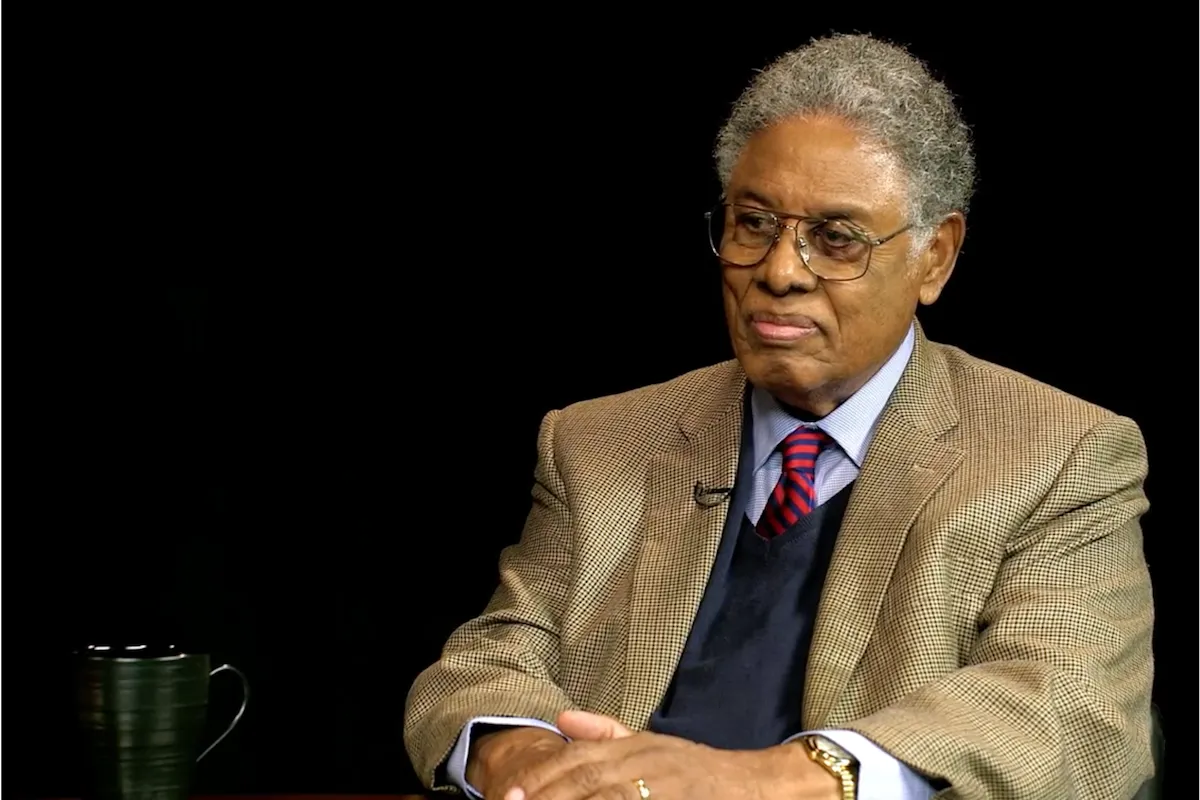Table of Contents
Walking into the Hoover Institution’s Traitel Building on a cool Monday morning two weeks ago, I was immediately confronted with posters of Professor Thomas Sowell’s most important quote: “It doesn’t matter how smart you are, if you don’t stop and think.” Sowell’s words set an unmistakable purpose for the two-day event honoring the economist’s legacy: celebrating intellectual humility and character.
The event’s surprise guest made that theme impossible to ignore. Justice Clarence Thomas, appearing for an interview with Peter Robinson, spoke with deep emotion about Sowell’s influence on his life and jurisprudence. Sowell’s intellectual humility was “a cup of cold water in the desert” for him: “Tom [Sowell] told me what he thought, but he never told me what to think.” Through long talks, Sowell mentored Thomas, shaped his sense of meaning, and catalyzed his career, producing a titan of modern conservative jurisprudence.
Beyond the tribute, Thomas offered the Stanford student something more: his insistence, drawn from Sowell’s work and his own unlikely journey, that character trumps intelligence, that to achieve anything worthwhile, intelligence must be anchored in agency, attitude, and discipline.
Look no further than Justice Thomas’ biography. Growing up dirt-poor in rural Georgia under Jim Crow, raised by his grandparents on a farm without clean water, Thomas attended a seminary school with few resources. What set him apart was discipline. One anecdote stuck with me: Thomas was to study Algebra II in tenth grade, but hadn’t taken Algebra I. So, at his teacher’s suggestion, he worked through an Algebra I textbook the summer before while laboring on his grandparents’ farm. Thomas’ meritocratic career was built on initiative, determination, and cultivated skill more than innate intelligence; in his own words, “I wasn’t the smartest, even at the seminary.”
In a way, deemphasizing IQ is the libertarian economic project; it’s certainly Sowell’s. For a century, intellectuals have promoted big government run by fellow expert-bureaucrats to solve society’s problems. Shielded from accountability, vexed by complex, adaptive systems, and burdened by their own elaborate rationalizations, these intellectuals, however smart, inevitably overreach their intelligence. They fail to grasp Sowell’s insight: “There are no solutions, only trade-offs.”
Consequently, their megaprojects - urban renewal, the Great Society, the one-child policy - leave behind thousands of cities hollowed out, millions of people impoverished, countless families broken, and demographic crises to boot. Better outcomes often demand Sowell’s constrained vision - incrementally changing systems while incorporating the distributed wisdom that markets aggregate. In short, intellectual humility, not sheer cognitive power.
Everyone agrees that intelligence without judgment can serve evil ends. There’s a more potent criticism of IQ triumphalism. Even for invention, the purely intellectual task that should most reward raw cognitive power, disposition, and character matter just as much.
Consider Fritz Haber, who developed efficient nitrogen fixation. His process produces fertilizers that feed half the world’s population today. Haber succeeded not because he was smarter than other chemists working on the problem, but because he had the discipline and disposition to see past apparent failure. Several researchers had attempted similar processes and quit, or resorted to magical thinking, when single-pass yields topped out around eight percent. Haber looked through these disappointing results and saw that, by recycling reactants, he could make the reaction work, achieving extraordinarily high yields.
Einstein’s breakthrough happened similarly. Other physicists, blindingly intelligent, diffidently proposed elaborate ether theories to preserve cherished assumptions, theories that, given their diffidence, they must have known on some level to be false. Einstein, then a patent clerk pursuing physics on the side, had the courage to embrace what the evidence demanded: the deeply disturbing conclusion that space and time were relative. Seeing it required intellectual character, not just smarts.
Throughout history, from fertilizer to relativity, from continental drift to the bitter lesson in AI, “purely intellectual” breakthroughs have belonged to those with the discipline and disposition to peer past conventional wisdom.
Intelligence matters. But it’s one factor of production among a constellation, not the defining marker of merit. The key discoveries and achievements have always required more - the stomach, attitude, initiative, and integrity to follow an insight wherever it leads, and to heap intelligence upon an obstacle until it breaks.
For me, this is Sowell’s largest legacy: he embodies intellectual humility. Sowell, almost alone, dared to confront the dread reality that credentials, expertise, and intelligence, even - especially - with good intentions, far from guarantee problem-solving success, let alone good judgment. That’s what “stop and think” tells us: intelligence anchored in humility, care, and character achieves what brilliance itself cannot.





